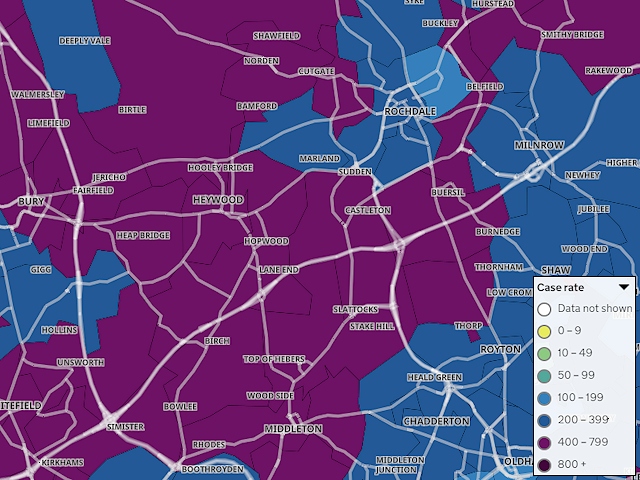New Covid hotspot emerges in Rochdale as booster roll-out gathers pace
Date published: 13 December 2021

Photo: Gov.UK
Cases of Covid-19 in the Rochdale borough in the week to 7 December
A new Covid hotspot has emerged in the borough of Rochdale as the booster roll-out gathers pace.
The latest hyperlocal data shows that the area of 'Heywood Hopwood & Siddal Moor' had the highest infection rate over the week to 7 December.
The area recorded 74 positive tests – 36 more than the previous seven day period – which is a rate of 728.7 cases per 100,000 people.
On Sunday night Prime Minister Boris Johnson addressed the nation following the chief medical officers’ decision to raise the Covid Alert level to 4.
During the broadcast, he told people: “I am afraid we are now facing an emergency in our battle with the new variant, Omicron, and we must urgently reinforce our wall of vaccine protection to keep our friends and loved ones safe.”
Mr Johnson said the step had been taken ‘because of the evidence that Omicron is doubling here in the UK every two to three days’.
He added: “We know from bitter experience how these exponential curves develop.
“No-one should be in any doubt: there is a tidal wave of Omicron coming.”
The UK Health Security Agency divides up each borough into neighbourhoods of roughly 7,000 people for statistical purposes.
And in further worrying news for this part of the borough, ‘Heywood Town’ was also the fifth worst affected area. There were 68 cases, equating to an infection rate of 643.7 per 100k people.
There are also reasons for concern in neighbouring Middleton, where two places both recorded high numbers.
'Langley & Woodside' was the borough’s second worst affected area, with an infection rate of 702.9 per 100k. There were 83 cases in total – higher than anywhere else in Rochdale and 18 more than the previous seven days.
Meanwhile 'Middleton East' registered an infection rate of 654.2. There were 68 cases, which is up 29 on the week before.
It was 'Spotland Bridge' that saw the biggest rise, with cases jumping from 26 to 55 – a significant increase of 111.5%.
Rochdale is the fourth hardest hit place in Greater Manchester according to the latest borough-by-borough figures (for the week to December 8), with only Trafford, Bury and Stockport having higher rates.
More encouragingly though, the borough's overall infection rate of 469.9 is lower than the England average of 509.6.
Rates are lowest in 'Wardleworth & Newbold Brow' – which has often recorded some of the borough’s highest rates over the course of the pandemic.
The latest figure for this area near the town centre is 178.3 per 100.
Two other central areas are also fairing relatively well – 'Deeplish' and 'Central Rochdale & Mandale Park' recording rates of 280 and 245 respectively.
These are another two areas that have been hit hard since March 2020, but seem to be keeping cases low at present.
The areas being used by the UK Health Security Agency are Middle Layer Super Output Areas (MSOA) used for the reporting of small area statistics in England and Wales. Although some of the MSOA in the borough of Rochdale have the same names as certain electoral wards, an MSOA is not the same area or population as an electoral ward. The minimum population of an MSOA is 5,000 and the mean is 7,200.
Read more: Click here to view the interactive map of cases
Nick Statham, Local Democracy Reporter
Do you have a story for us?
Let us know by emailing news@rochdaleonline.co.uk
All contact will be treated in confidence.
Most Viewed News Stories
To contact the Rochdale Online news desk, email news@rochdaleonline.co.uk or visit our news submission page.
To get the latest news on your desktop or mobile, follow Rochdale Online on Twitter and Facebook.


